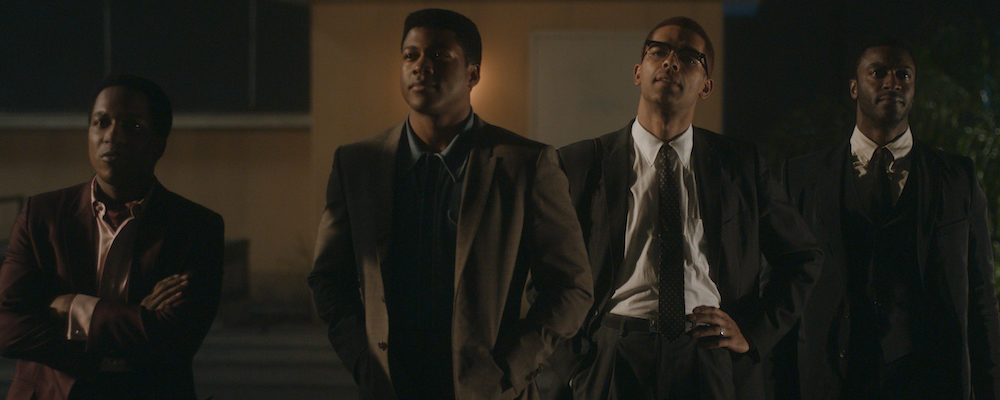‘One Night in Miami’: Regina King Explores the Very Human Sides of Four Black Legends
Sandra Miska
Four Black icons come together for a memorable evening in “One Night in Miami,” the feature directorial debut from Oscar-winning actress Regina King. Adapted by writer Kemp Powers from his play of the same name, the film speculates what transpired during a fateful night in February 1964 after young boxer Cassius Clay (Eli Goree), soon to be known as Muhammad Ali, won a major match at a the Miami Convention Hall. Afterwards, he met up with his spiritual advisor, activist Malcolm X (Kingsley Ben-Adir), NFL star Jim Brown (Aldis Hodge), and singing sensation Sam Cooke (Leslie Odom Jr.). While we’ll probably never know exactly what went down in Malcolm’s modest hotel suite (Brown is the only one of the four men still living), Powers and King imagine compelling discussions on race, religion, celebrity, and more.
Before we get to the hotel, King and Powers present each man in his own world. Cassius is dedicated to his training, but his trainer, Angelo (Michael Imperioli), and his sponsors aren’t thrilled about his associate with Malcolm, a man who speaks openly of “white devils.” Little do they know, Cassius, under Malcolm’s guidance, is about to change religions and join the Nation of Islam. But little does Cassius know, Malcolm is about to depart the Nation of Islam due to its leader’s sexual abuse of young girls. Meanwhile, Sam, who has already had a number-one hit, has a disappointing time performing for an underwhelming all-white audience at the Copacabana.
But the most uncomfortable moment occurs when Jim visits Mr. Carlton (Beau Bridges), a white family friend in Georgia, who heaps praise on him before delivering a shocking insult. Later, when the men engage in a fascinating conversation about race relations at the hotel, Jim calls out those white people who are fake friendly, admitting he prefers the racist rednecks. But that’s not to say he’s in agreement with Malcolm, who famously said “the chickens have come to roost” following the Kennedy assisination a year prior.
Despite all four guys being successful Black men who have risen to the top of their respective fields, it’s not all high fives and congratulations, as Powers and King do a superb job of exploring the mens’ strengths, weaknesses and differences. Malcolm calls out Sam for being, in his view, an Uncle Tom, even going as far as to say Bob Dylan has made a bigger impression as an ally for writing a song as powerful as “Bridge Over Troubled Water.” However, in a memorable scene, Sam reveals how helped at least one Black man, his protégé Bobby Womack, become rich by licensing a song Womack wrote, “It’s All Over Now,” to the Rolling Stones. While Malcolm has his ways of doing things, Sam prefers to achieve success by working inside the system.
While all four men are fascinating figures worthy of their own individual biopics (Malcolm and Cassius have already been the subject of their own), and all four actors give phenomenal performances, Ben-Adir is the MVP here as Malcolm X. He gets inside of the man’s psyche, and we see here, months before his assasination, that he is filled with a sense of foreboding. He expresses his anxieties to his wife, the frequently pregnant Betty Shabazz (Joaquina Kalukango), who feels helpless as she watches over the children and the home in his absence. It’s fascinating to see the disconnect between the militant man that is shown to the media and the softer version of Malcolm, a family man whose biggest vice is vanilla ice cream.
By the end, King and Powers succeed in capturing the very human sides of these men who have become almost mythical over the years, especially Malcolm and Cassius. The film also serves to remind us how far society has come in some ways in regard to race, while we still have ways to go in other ways.
“One Night in Miami” releases Dec. 25 in select cities and Jan. 15 on Amazon Prime Video.

